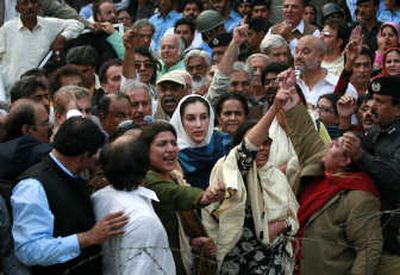Bhutto calls for new rally

ISLAMABAD, Pakistan – A massive security clampdown by President Pervez Musharraf snuffed out a planned opposition rally by former Prime Minister Benazir Bhutto on Friday but left the country facing more days of tense standoff as Bhutto was released from temporary house arrest and called for a rally next week.
Musharraf’s dispatch of thousands of police and soldiers to surround Bhutto’s home and seal off the planned site for the event drew international criticism and led the opposition to step up its demands that he retract the state of emergency through which he suspended the constitution last week.
It also intensified the personal power struggle between Musharraf and Bhutto, who returned from exile last month after working out a power-sharing deal with the general. Since the state of emergency, she has rallied the opposition by laying down an ultimatum for him to release thousands of detainees, step down as army chief of staff and hold elections in January as planned.
After reportedly arresting thousands of her supporters, police twice stopped Bhutto from leaving her house to attend the rally Friday. After the second attempt, they allowed Bhutto to speak to two dozen members of parliament from her party and at least 300 journalists, kept behind barricades of concrete and barbed wire.
Bhutto called the day’s events a “victory” for her party and tried to justify her earlier negotiations.
“I did hold talks with Musharraf,” said Bhutto, standing up and speaking through the sunroof of a white SUV. “When he suspended the constitution, made arrests and suspended fundamental rights, those talks obviously came to an end.”
But Bhutto’s aides left open the possibility of a return to negotiations – and possibly a calming of protests – if Musharraf were to fulfill Bhutto’s demands.
Bhutto vowed to hold a march from the eastern city of Lahore to Islamabad on Tuesday, although authorities have banned demonstrations and gave little indication that it would be allowed.
Late Friday night, Pakistani authorities said that Bhutto had been freed from the virtual house arrest she was under after police surrounded her home in the morning. But she had not left the premises, and Sherry Rehman, a spokeswoman for Bhutto’s Pakistan People’s Party, said Bhutto was still being held.
“She’s still barricaded by the police,” Rehman said. “She’s not been released.”
The Bush administration called on Musharraf on Friday to allow Bhutto and other opposition leaders to move freely.
Meanwhile, U.S. Defense Secretary Robert Gates signaled the administration’s concerns that Pakistan’s internal political turmoil could undermine the U.S.-led battle against Islamic radicals along the Afghan border.
“The concern I have is that the longer the internal problems continue, the more distracted the Pakistani army and security services will be in terms of the internal situation rather than focusing on the terrorist threat in the frontier area,” said Gates, who spoke to reporters while returning from a visit to Asia.
Musharraf’s only concession this week – after a phone call from President Bush – was to announce that parliamentary elections will be held before Feb. 15, a delay of a month, and that he will step down as army chief before being sworn in as president. But the police response Friday shows that Musharraf has no intention of allowing any public opposition, despite intense Western pressure and threats that foreign aid will be cut.